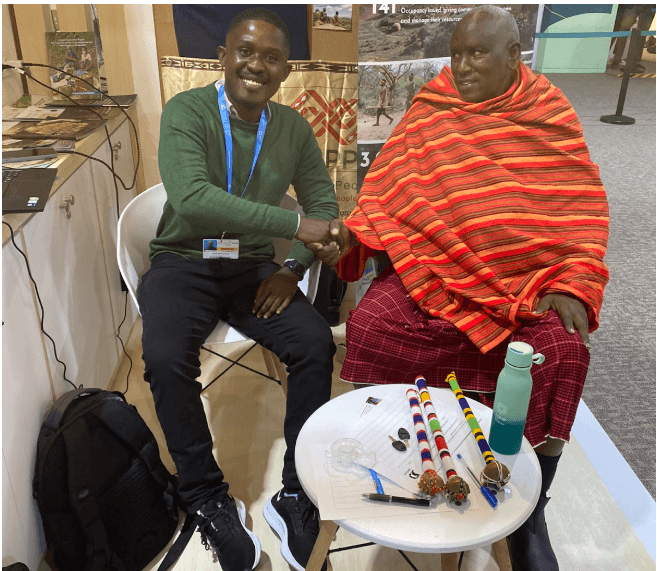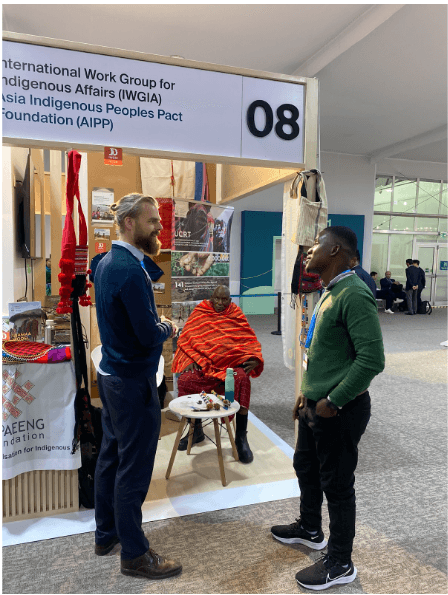Belém's Crucible: Indigenous Demands for the Amazon COP30 🌎

Indigenous Leadership at the Center
The upcoming COP30 in Belém, in the Brazilian Amazon, has been dubbed the People's COP, creating immense expectations for Indigenous Peoples and other marginalized groups who are on the front lines of the climate crisis.
For the first time, this critical global summit is hosted in the Amazon, a biome vital to global climate stability and home to millions of Indigenous Peoples and Local Communities (IPLCs). Drawing on momentum from COP29, where Indigenous leaders launched the Indigenous Peoples' Troika to strengthen participation across COPs, the clear demand for COP30 is a decisive shift from pledges to concrete, rights-based, and locally-led action that directly addresses the disproportionate impacts of climate change on vulnerable populations.
At the IWGIA booth in Baku, Azerbaijan, a discussion featuring the Founder of Indigenous People Alliance Ghana emphasized that true climate justice requires a structural transformation — recognizing Indigenous rights, equitable climate finance, and authentic participation in decision-making.
🌿 Recognition of Territorial Rights as Climate Action
A primary and urgent expectation is the formal and legal demarcation and protection of Indigenous Lands (ILs) and territories by states. Studies consistently show thatIndigenous-managed lands are the world's most effective carbon sinks, making territorial protection one of the most cost-effective mitigation and biodiversity strategies available. IPLCs are demanding that the protection of their territories be explicitly recognized within national climate plans, or Nationally Determined Contributions (NDCs), of the host country Brazil and other nations. This is viewed not as an act of charity, but as a crucial global climate and biodiversity policy.
💰 Direct Climate Finance and Ending Green Colonialism
Marginalized groups are demanding direct, accessible, and rights-based climate finance that bypasses complex institutional requirements and intermediary "gatekeepers."Initiatives like the Tropical Forest Forever Facility (TFFF), which will be launched at COP30 and proposes reserving at least 20% of its funds for IPLCs, set a new global benchmark for equitable finance mechanisms.
Critically, there's a strong call to regulate and halt funding for extractive activities — such as fossil fuel andmining projects — occurring in or near Indigenous territories, often framed as`sustainable development` or green colonialism.The message is clear:
true climate transition cannot be built on the destruction of Indigenous livelihoods and cultures.
🗣 Meaningful Participation and Institutional Power
Inclusion must translate into meaningful decision-making power. COP30 needs to strengthen the role of the Local Communities and Indigenous Peoples Platform (LCIPP) and its Facilitative Working Group (FWG)—which had its mandate renewed at COP29. Beyond this, IPLCs are demanding full and effective participation, including co-presidency in decision-making, and securing the right to Free, Prior, and Informed Consent (FPIC) for any measure affecting their lands or cultures. Brazil has shown positive intent by creating the International Indigenous Commission as part of its "People's Circle's leadership, but the expectation is for this to translate into influence on core negotiation outcomes, not just side events.
⚖️ Indigenizing the Rulebook & Just Transition
Finally, COP30 is expected to "Indigenize the Rulebook", enriching the Paris Agreement with Indigenous contributions, particularly in defining global adaptation indicators under the Global Goal on Adaptation (GGA). The Just Transition Work Programme must ensure that the global shift to a low-carbon economy guarantees that marginalized groups, who are already disproportionately harmed, are not further disadvantaged by transition policies. The consensus is that climate justice can only be achieved by fully recognizing the cultural and territorial rights of all Indigenous Peoples and other structurally excluded groups, like women and youth, placing their traditional knowledge and leadership at the very center of the global climate response.

Author Information
Author: Lord Offei-Darko (lord@ipagh.org)
Affiliation: Founder & CEO, Indigenous People Alliance Ghana
Event: Discussion at IWGIA Booth — COP29, Baku, Azerbaijan